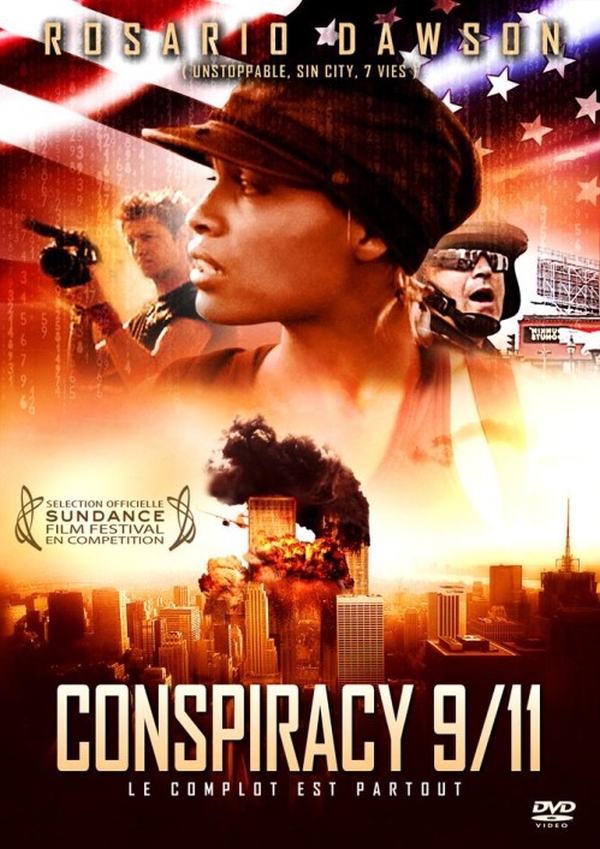
Check out this French movie poster. Rosario lets the truth about 9/11 slip out to the French populace. The French wanted a taste of Freedom Fries. Rosario Dawson gave them some.


Check out this French movie poster. Rosario lets the truth about 9/11 slip out to the French populace. The French wanted a taste of Freedom Fries. Rosario Dawson gave them some.
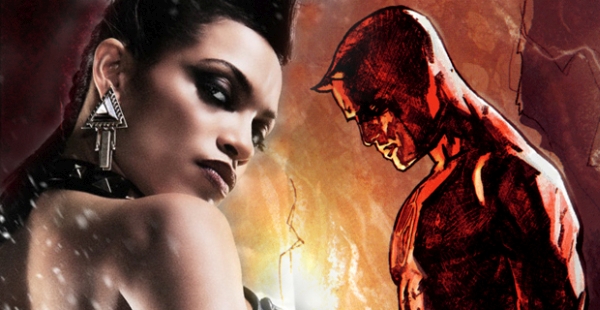
TIME spoke with Dawson about Marvel’s new dark side, the rise of the female superhero and why Netflix disrupting the entertainment industry is good for actors.
TIME: How familiar were you with the greater Marvel Universe before this?
Rosario Dawson: I grew up around comics. We watch the movies, we talk about them, we geek out and play the games. I’ve always wanted to be a part of the Marvel Universe and am a big fan of the spandexed, caped heroes’ world.
Daredevil is even more fun than I expected because it’s shedding light on characters who don’t always get attention. I think Night Nurse only had, like, four issues. And Claire Temple used to be married to Luke Cage, which is interesting. Only about half of my nerd squad knew who Night Nurse was, and the other half were like, “Who?” I think that’s really cool.
It’s fun to be involved in bringing these street-level characters to life. These are average Joe folks who have these honed skills, but they’re fallible. They don’t have alien strength or mutant capabilities because of radioactive spiders or whatever. There’s a kind of fun, grittier localized energy in this show.
Daredevil seems darker than the Marvel movies, or even Agents of S.H.I.E.L.D. and Agent Carter.
I’ve been a part of telling darker and grittier comic stories before with Sin City. Frank Miller was really at the heart of that with Daredevil and Batman, too. He showed the psychologically damaged side to vigilante justice. And that made sense: If you’re going to fight petty crime for strangers in a spandex suit just because, that’s weird, right? So it’s interesting to explore the psychoses of these people.
“Justice is blind” is the tagline, and that’s not just a nod to Matt Murdock’s blindness. We turn a blind eye a lot to how justice is served and what it looks like. The lines between good guy and bad guy blur. It begs the question, what would you do? It’s different if you have super human strength, but these characters don’t. So what would you do?
Why do you think Claire and Matt feel the need to help other people?
It’s an interesting thing to know what your calling is, and know what you’re great at and let that pull you. With great power comes great responsibility. It’s so true. I was reading about Neil deGrasse Tyson and how he would love to go back to being a scientist. He wants to disappear into his house for three years and study some part of space that only 12 other scientists in the world care about. But he’s really good at what he’s doing—being able to speak in layman’s terms about science in a way that’s exciting to people and brings it to the masses. Ultimately, he said it’s a privilege for him to do what he does.
But that’s sort of what this is getting at. It’s a really fun thing to explore.
As a woman, I’m anxiously awaiting the first big superhero movie starring a woman.
Me too.
Do you feel like Claire’s more than a sidekick or love interest?
Yeah. I love that she’s shown up in Spider-Man’s world and other places in the Marvel Universe. She becomes this person who helps these heroes. Who else would they turn to? They have to hide their secret identities from everyone else.
The show explores how necessary it is for two people to finally have their masks off with each other. For Matt Murdock, this is the first person he has that’s going to be able to see that transition for him. For her, she’s someone who also throws herself into the fray and had made it her life mission to help, even if that means risking her own life. But she gets confronted with the question: How far will you go? What does it mean if you’re helping someone who is maybe going to hurt other people?
My character is a stand-in for the audience. She’s not a love interest—she’s this skeptical eye looking at this strange situation. She’s the one who can be like, “You’re not really good at this.” That makes it feel more real. The relationships are what we’re really following in the show. It’s really a legal procedural, but with added spandex!
But I’m excited to see where it goes. I’ve only seen the first two episodes. They’re so mean.
Really?
Yes! Also I haven’t even read all the issues, so I don’t even know what is going to happen. I’m going to be watching it all in a binge marathon like everyone else.
Are you usually a binge TV watcher?
Now I am. It’s such a new thing. When it first started, people would only binge-watch things when they were sick, remember? People would be like, “I got the flu so I binged watched this show over the weekend.” Now it’s just this regular thing you do.
As an actor, do you feel like you have more options now with platforms like Netflix becoming so popular?
Absolutely. I love it. There’s a lot of films that aren’t being made because studios want to make these big tentpole movies since theater attendance is dropping—probably because everyone is just watching on their device whenever they feel like it. So they’re making fewer movies, or at least not investing the budget into the types of movies they use to.
But they are starting to [invest in] television. Writers are getting more work. And they can create, like, a 13-hour movie that you can consume however you want.
But that might mean smaller audiences.
Yes, but now you don’t have to make things that appeal to everybody. Now you can have subcultures and subcultures within subcultures, and everyone can have access to whatever specific thing they’re interested in. We don’t have to all conform into a box, and—especially for someone into comics or things like that who wasn’t catered to before—I think that’s really remarkable.
People can get their authentic selves out there. That means that students can create and post things and people will see it. If you want more creative energy out there, then this is all a good thing.
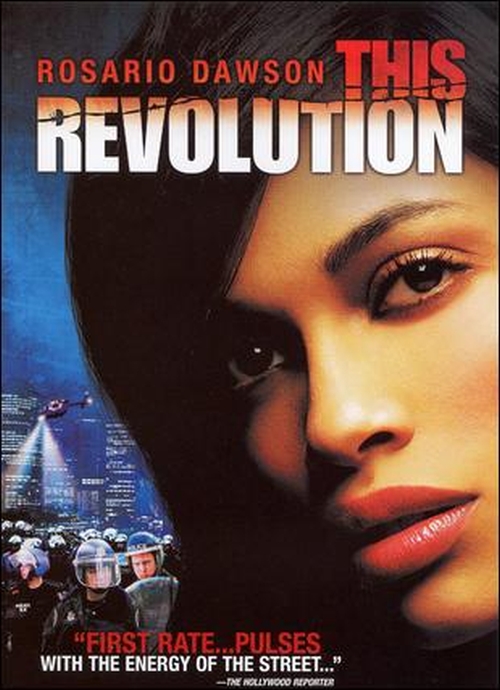
Rosario flexes her acting skills in GNN’s 2005 movie This Revolution.
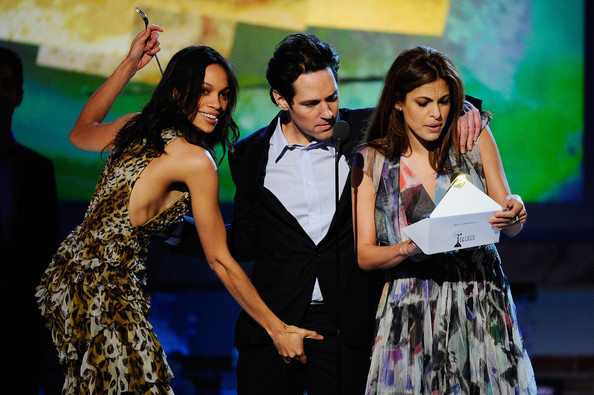
From Latoya Peterson at Racialicious
At the Independent Spirit Awards, the writers apparently thought it would be hilarious for Paul Rudd to grab Eva Mendes’ breasts. In the video above, Mendes talks about how they had “this really funny bit” where Rudd would “grab her tits,” then shock the audience, then presumably say something funny to incite more laughter.
But Rosario Dawson wasn’t having it.
The video cuts back to Dawson firmly grabbing Paul Rudd’s crotch. However, note what else she is holding in this picture:
CNN transcribed her interview with Access Hollywood:
“He did this vice grip on her breast, and I was like, OK, it was funny for like a second. But then it kept going and going and going. And then the lights went down and the clip started rolling and he was still vice-gripping her! I was sitting there with my fork like, ‘If he doesn’t stop, I’m going to stab him with my fork.’”
Rudd didn’t remove his hand, so Dawson went into action.
“I got up there and I stabbed him with my fork,” she says. “He didn’t stop, so I was like, alright, I’m going to grab his package… I was like, I’m really sorry, Paul, I don’t mean to be offensive. But you’re kind of being offensive.”
Dawson kept a hold on the surprised actor until he let go of Mendes.
“I’m a women’s rights activist and I was getting a little tired that he was grabbing her onstage for half an hour. I was kind of getting over it,” Dawson later explained to “Access Hollywood.” “Why do men always get to cop the feel? Women get to cop a feel too! Just keep it equal opportunity.”
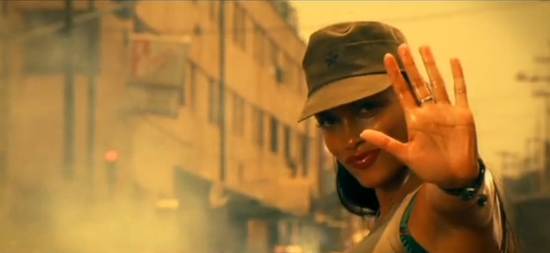
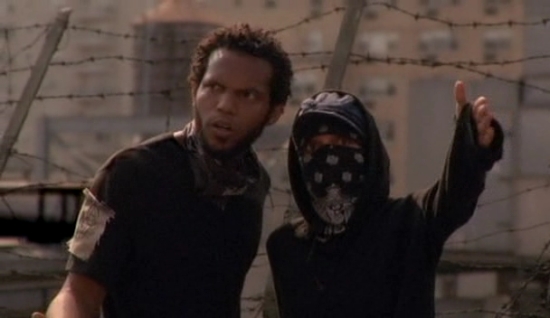
A black bloc is a tactic for protests and marches, whereby individuals wear black clothing, scarfs, ski masks, motorcycle helmets with padding or other face-concealing items and often carry some sort of shields and truncheons. The clothing is used to avoid being identified, and to, theoretically, appear as one large mass, promoting solidarity.
The tactic was developed in the 1980s by autonomists protesting squatter evictions, nuclear power and restrictions on abortion among other things. Black blocs gained broader media attention outside Europe during the 1999 anti-WTO demonstrations, when a black bloc damaged property of GAP, Starbucks, Old Navy, and other multinational retail locations in downtown Seattle.
Rosario’s parents were squatters. You can download the Anarchist’s Cookbok HERE